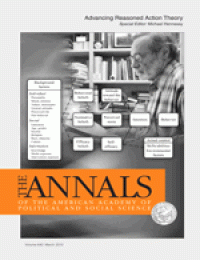
Journal Articles
Beliefs Underlying Eating Better and Moving More : Lessons Learned from Comparative Salient Belief Elicitations with Adults and Youths
The reasoned action approach has been used to identify the determinants of a behavior to be modified by social and behavioral interventions. Information on the specific beliefs underlying behavioral decisions is vital to intervention design. More attention is needed on the salient belief elicitation—a critical step in a theory-based formative research process. This article considers the methodological issues involved in conducting a salient belief elicitation with special attention to an elicitation that allows the comparison of results across several behaviors and priority groups. The author uses the behaviors underlying overweight and obesity as her central example. To support the development of interventions to improve cardiovascular health and to explore methods for a comparative analysis of salient belief elicitations, semistructured interviews were conducted with 243 adults from two rural and two urban worksites in Indiana and 344 students from three middle schools in rural Indiana. Content and frequency analyses identified the modal salient beliefs underlying several eating and physical activity behaviors. Illustrative results are presented, and recommendations for salient belief elicitation are discussed.
Availability
No copy data
Detail Information
- Series Title
-
The ANNALS of the American Academy of Political and Social Science
- Call Number
-
-
- Publisher
- Thousand Oak : sage publisher., 2012
- Collation
-
-
- Language
-
English
- ISBN/ISSN
-
00027162
- Classification
-
-
- Content Type
-
-
- Media Type
-
-
- Carrier Type
-
-
- Edition
-
Vol. 640 no. 1, March 2012,pp. 81-100
- Subject(s)
- Specific Detail Info
-
-
- Statement of Responsibility
-
-
Other version/related
No other version available
File Attachment
Comments
You must be logged in to post a comment
 Computer Science, Information & General Works
Computer Science, Information & General Works  Philosophy & Psychology
Philosophy & Psychology  Religion
Religion  Social Sciences
Social Sciences  Language
Language  Pure Science
Pure Science  Applied Sciences
Applied Sciences  Art & Recreation
Art & Recreation  Literature
Literature  History & Geography
History & Geography